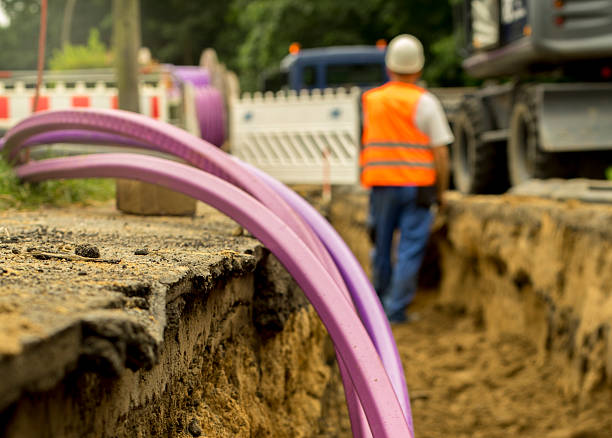Did you know that a simple wire in your home plays a huge role in keeping you safe from electrical shocks?
This unsung hero is the ground wire. Let’s dive into what this wire does and why it’s so crucial for our homes!
A ground wire acts as a safety net for your home’s electrical system. It’s usually green or sometimes bare without any insulation. This wire works like a guardian, ensuring that any stray electricity is harmlessly directed into the ground outside your house. For instance, if there’s a fault in your toaster or washing machine, the ground wire safely channels the excess electricity away, preventing shocks.
Why is this wire so vital? It safeguards not just people but all the electronic devices and appliances in your home. It’s a key component in making electrical use in our homes safe. Think of it as the quiet guardian always ready to protect your family from the unseen dangers of electricity.
Always remember, electrical work is best left to the experts. If you suspect any issues with your wiring, it’s safest to contact a professional electrician. They’re trained to manage these protective wires safely and effectively!
What is a Ground Wire?
A ground wire is a crucial component in your home’s electrical system. It’s typically green, or sometimes just a bare wire, without any coating. Its main job is to act as a safety line. When your electrical gadgets or systems mess up, the ground wire steps in to carry away the unwanted electricity. This helps prevent any potential electric shocks or fires by redirecting the excess electricity into the ground outside your house.
But what makes the ground wire so important? It’s all about safety and prevention. Without a ground wire, any electrical fault could turn dangerous quickly, putting you and your family at risk. This wire ensures that excess electricity has a safe escape route, keeping everything from your kitchen blender to your bedroom lamp safe to use.
Additionally, it’s crucial for meeting safety regulations. Most modern electrical systems are designed with ground wires as standard to comply with building codes. These regulations are put in place to ensure that every electrical setup is safe and up to date.
So next time you plug in an appliance, remember the ground wire working quietly behind the scenes. It might not be visible, but its role in keeping your home safe from electrical hazards is indispensable. Always consult a professional electrician if you’re unsure about your home’s wiring or if you plan any electrical upgrades to ensure your ground wires are properly installed and functioning.
Related: Types of Electrical Wire for Residential Buildings
Why is the Ground Wire Important?
The ground wire, often green to make it easy to identify, is your home’s safety champion. Here’s what makes it essential:
- Prevents Electrical Shocks: The ground wire provides a path for electrical current to safely return to the ground if there’s a fault in your appliance. This means if something goes wrong, the electricity won’t shock you but will travel safely back to the earth.
- Protects Appliances: Not only does it protect you, but it also keeps your appliances safe. By redirecting the excess electricity, the ground wire prevents damage to the motors and circuits of your appliances, extending their life.
- Enhances Overall Safety: Every electrical system is susceptible to occasional faults. The ground wire acts as a preventive guard, ensuring that these faults don’t lead to serious accidents like fires or electrocution.
- Compliance with Safety Regulations: Having a proper grounding system, including a ground wire, is often required by electrical safety codes. This compliance is not just about following the law; it’s about ensuring that every electrical setup in your home is safe to use.
How Does a Ground Wire Work?
Have you ever noticed a green or sometimes bare wire in electrical setups at home and wondered what its purpose is? This wire, known as the ground wire, is critical for maintaining safety in electrical systems. The ground wire serves as the most direct and safest route for stray electricity to return to the ground, where the earth acts as a natural conductor. Electricity naturally seeks the path of least resistance, and the ground wire provides just that.
When electrical faults occur, such as a wire getting damaged or an appliance malfunctioning, the ground wire acts as a safety valve. It safely channels this fault current away from the appliance and directs it into the ground. This is crucial because, without a ground wire, the stray current could find other paths, which might include water pipes or even humans, potentially leading to serious injuries or even fatalities.
Moreover, the ground wire helps to protect appliances and prevent electrical fires. It does this by conducting any excess current that may arise from faults or surges safely into the earth, thus preventing the current from overheating appliances or igniting nearby flammable materials. This protective feature not only extends the lifespan of household appliances but also enhances overall home safety.
The use of ground wires is also a standard safety requirement in many building codes and electrical standards, emphasizing its importance in both residential and commercial settings. The distinctive green color or the bare appearance of ground wires ensures they are easily identifiable. This aids anyone working with electrical systems, be it professional electricians or DIY enthusiasts, to spot and ensure proper connections, thereby maintaining the integrity and safety of the entire electrical setup.
Related: What Size Generator Do I Need for a 3 Bedroom House
Checking and Maintaining Your Ground Wire
To ensure your ground wire is doing its job properly, it’s important to check it regularly and maintain it if necessary. The ground wire, usually green or bare, is easy to spot. It helps direct unwanted electricity safely into the ground, preventing any dangerous shocks.
- Start by visually inspecting the ground wire. Look for any signs of wear, tear, or corrosion. This could include things like frayed wires or greenish oxidation on copper wires, which is common in damp areas. If the insulation on the wire is damaged, it’s a sign that it needs attention.
- Make sure that the ground wire connections are tight. Loose connections can be dangerous as they might not provide an effective path to the ground. You can find these connections typically at your circuit breaker box or any metal junction boxes in your home.
- If you’re not sure about what to look for or find anything unusual, it’s a good idea to call in a professional electrician. They can perform a thorough check and ensure that your home’s electrical grounding is up to standard.
- Set a regular schedule for checking the ground wire, such as once a year. This is especially important in older homes or in areas with high humidity, which can accelerate corrosion.
Conclusion
The importance of a ground wire is vital for ensuring electrical safety in any setup. It serves as your first line of defense against potential electrical hazards, safely directing stray currents into the earth. Ensuring your ground wire is properly maintained can significantly enhance the safety and efficiency of your home or business’s electrical systems.
At Ferezco Power Systems, we take this knowledge and apply it to the broader scope of generator services. Based in San Antonio, TX, and serving surrounding areas, we offer comprehensive generator repair services including repair, maintenance, and load bank testing. Whether it’s diesel generator repair or generator commissioning and testing, our expert team ensures your systems are optimized for performance and safety. With Ferezco Power Systems, you can expect reliability and professional expertise to keep your operations running smoothly and safely.




